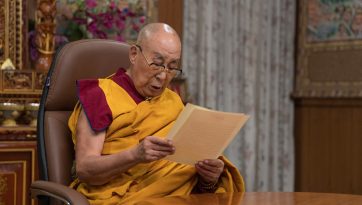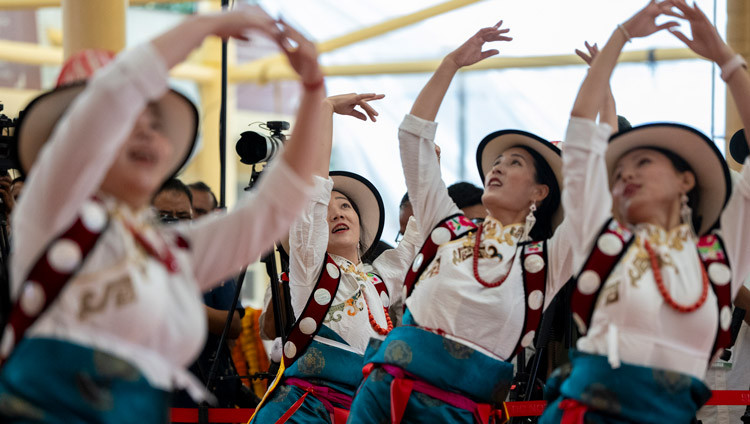The Yoga of the Inseparability of the Guru and Avalokiteshvara
Thekchen Chöling, Dharamsala, HP, India – This morning Ven Professor Samdhong Rinpoché walked through the courtyard, escorted by Lama Ngawang Norbu, an MLA from Arunachal Pradesh, and the Chairman of the Committee organizing today’s teachings and tomorrow’s Long-Life Ceremony. Reaching the Tsuglagkhang, the Main Tibetan Temple, he took his seat to the left of which sat present and former officials of the Central Tibetan Administration, while to the right were Mönpa people from Arunachal Pradesh. Rinpoché explained why he was there.
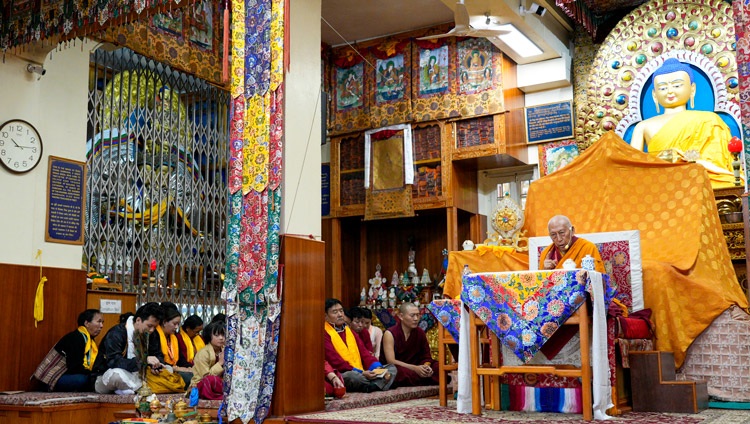
Ven Professor Samdhong Rinpoché speaking at the Main Tibetan Temple in Dharamsala, HP, on September 6, 2024. Photo by Lobsang Tsering
“There had been a plan for His Holiness the Dalai Lama to teach today and attend a Long-Life Ceremony tomorrow. However, the plan changed and I was asked to teach on his behalf. Listening to me today you will not necessarily create a Guru disciple connection with me.”
The ‘Heart Sutra’ was recited, tea was served and a mandala offering was made.
Rinpoché quoted a verse from Jé Tsongkhapa’s ‘Song of Spiritual Experience’:
This life of liberty surpasses a wish-granting jewel,
And you will find the like of it only this once.
It is rare, easily lost and brief as lightning in the sky.
With this in mind, understand that all worldly actions
Are like chaff in the wind, so you must constantly
Make best use of this life, both day and night.
I, a yogi, practised in this way,
You who aspire to liberation should do likewise.
“This precious human life is like a wish-fulfilling jewel. It is difficult to find and easily lost. If you cannot take advantage of this opportunity, there will be no greater cause for regret. You should not think you’ll find such a life again in the future. Therefore, set aside mundane activities and engage in spiritual practice.
“The Kadampa masters used to say, ‘If I don’t die in the next couple of months, I’ll do my best to create the causes for a better life in the future. If I don’t die for the next couple of years, I’ll do my best to create the causes for the lasting happiness of enlightenment.’ To do this we should rely on a proper teacher and enter into the practice of the Three Trainings.
“We are going to go through this Guru-Yoga practice, seeing His Holiness the Dalai Lama and Avalokiteshvara as inseparable. I’ll read the text slowly without making much comment. Whatever degree of practice of the being of three capacities you engage in, none can be done without the guidance of a Guru. In Tibet we see the Guru as the root of the path.
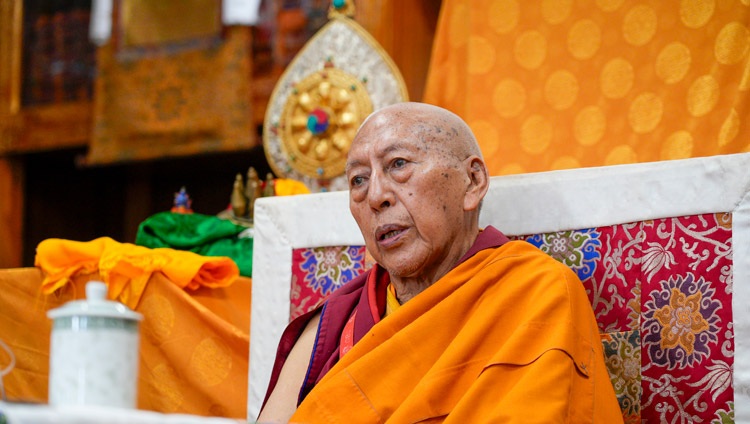
Ven Professor Samdhong Rinpoché addressing the congregation at the Main Tibetan Temple in Dharamsala, HP, on September 6, 2024. Photo by Lobsang Tsering
“The source of the Stages of the Path genre is Atisha’s ‘Lamp for the Path’. However, he made no reference to relying on a Guru. Tsongkhapa’s Treatises on the Stages of the Path have different outlines. In them we find explanations of how to rely on a Guru. Jé Rinpoché asked Manjushri the best way to make practice short and swift and he told him to see the Guru as inseparable from the deity. So Jé Rinpoché practised accordingly.
“There is reliance on the Guru in action and thought. When you do Guru-Yoga practice you do it in connection with the meditational deity with whom you have a special link. This text takes an approach that accords with the Guru-Yoga in Highest Yoga Tantra.”
Rinpoché noted that the main disciples for today’s teaching were people from Arunachal Pradesh, particularly those from Mön-yul. The deity with whom these people have a special connection is Avalokiteshvara, he who generated the awakening mind of bodhichitta before thousands of Buddhas.
The books of Kadam mention that Avalokiteshvara has special links with the Land of Snow, an area that comprises the Himalayan Region, places where people employ language based on four vowels and 30 consonants. Upali asked how this place should be identified. In the Vinaya it is written that the place where in winter if you pour water into an open vessel and it freezes into ice is known as the Land of Snows.
Also, the Land of Snows is a place where sentient beings were not tamed by the previous Buddhas. Indeed, it fell to the fourth Buddha of this fortunate aeon, Shakyamuni to do that. And it was prophesied that Avalokiteshvara, the embodiment of all the Buddhas’ compassion, the essence of the path, would be the patron deity of the Land of Snows.
“In this Guru-Yoga practice in which we see the meditational deity and the Guru as inseparable,” Ven Samdhong Rinpoché continued, “we visualize the six-syllable mantra, the supreme mantra at the Guru-Deity’s heart. We can explain the six syllables in terms of the Six Perfections. These are the antidotes to mental afflictions and obstructions to knowledge.
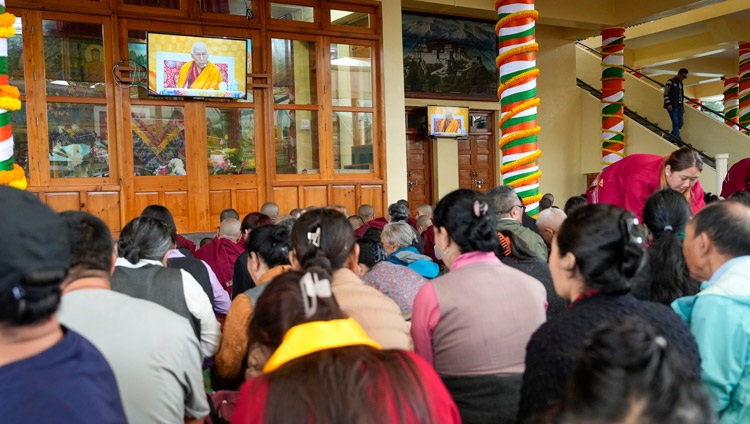
Members of the audience sitting in the courtyard watching Ven Professor Samdhong Rinpoché teaching at the Main Tibetan Temple in Dharamsala, HP, on September 6, 2024. Photo by Ven Zamling Norbu
“The Guru who shows the unmistaken path is here inseparable from Avalokiteshvara, who is the embodiment of compassion just as Manjushri is the embodiment of wisdom. If we can combine compassion with an understanding of emptiness we will attain Buddhahood.
“The text advises ‘Sit in the Vairochana posture with a straight back and so forth. Visualize your Guru and Avalokiteshvara as one—the object of refuge. In order to take refuge, we should fear the lower realms, the cycle of existence and obstructions to knowledge and be confident that the Three Jewels can protect us.
“In Tibet we take refuge and generate the awakening mind together saying—’I take refuge in the Three Jewels until I’m enlightened.’ All the Buddhist traditions of Tibet take this approach. We think— ‘By whatever collection of merit and wisdom I gather, may I serve sentient beings.’ In this way we restore and reinforce the Bodhisattva vows we have already taken. Next, we make the Four Immeasurable Wishes beginning with— ‘May all sentient beings have happiness and the causes of happiness. Then we purify the place in which we are going to invite the field of merit. We bless, increase and present offerings. We reflect— ‘By the power of truth of the Three Jewels, may these offerings become suchness. May they become great.’
“Visualizing the field of merit, we see a throne supported by lions on which rest a lotus seat with sun and moon cushions. On this sits the supreme Arya Lokeshvara, our supreme Guru, possessing the three kindnesses. He is smiling and pleased. His right hand is at his heart in the gesture of giving teaching, his thumb and index finger holding the stem of a lotus that supports a scripture and a sword. The other three fingers indicate the Three Trainings.
“In his left hand, in the gesture of meditative equipoise, rests a thousand spoked wheel. He wears the three robes of a monk and a golden Pandit’s hat.
“At his heart rests the exalted wisdom being Avalokiteshvara with one face and four arms. Over his left shoulder is draped the skin of an antelope. At his heart is the absorption being Hrih. He becomes the embodiment of all objects of refuge.
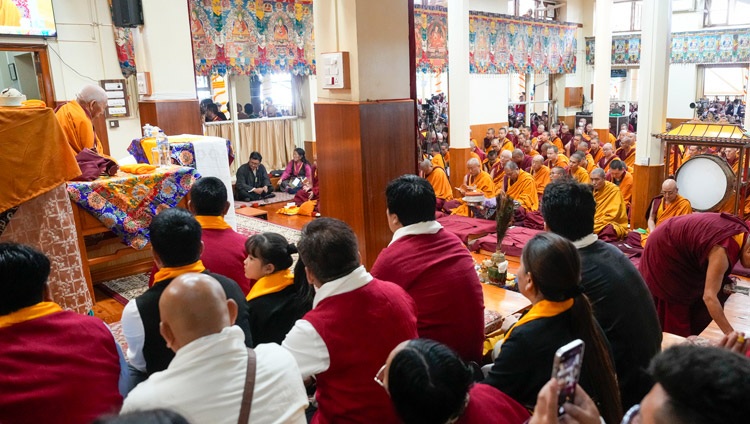
A view inside the Main Tibetan Temple during Ven Professor Samdhong Rinpoché’s teaching in Dharamsala, HP, India on September 6, 2024. Photo by Lobsang Tsering
“Having cultivated this visualization we perform the Seven Limb Prayer that includes prostrating, offering, confession and so forth. When you prostrate to the Guru-Deity imagine your body multiplied countless times. Then present an array of owned and unowned offerings. Make confession of how, overwhelmed by the darkness of ignorance, you have broken your vows and become involved with natural downfalls. Engage the four opponent factors—taking refuge, cultivating the awakening mind, generating sincere regret and resolving not to repeat such deeds in the future.
“What follows is rejoicing—the best way to accumulate merit and wisdom. Then request the Guru-Deity to awaken all sentient beings from the sleep of obstructions to omniscience and mental afflictions. Entreat him to remain firmly on the vajra throne. Make a dedication keeping in mind that the goal is the attainment of Buddhahood, to achieve which we need the care of a kind Lama. Conclude with a mandala offering.
“The blessings of the Guru in the form of nectars and rays flow down from his heart and enter the crown of your head. Recite the Guru’s name mantra.
“Review the Stages of the Path beginning by recognizing the difficulty of finding this life of freedom and fortune and how it is easily lost. Think, ‘Please bless me to practise the Three Trainings—ethics, concentration and wisdom.’
“In the practice of a being of great capacity think of the sufferings of our kind mother sentient beings and the wish to relieve them. Cultivate the yoga that unites the calmly abiding mind with special insight.
“’Having entered the gate of profound mantra—bless me to guard my vows and commitments. Having cut the all-creating karmic wind with the sharp sword of wisdom, bless me to realize the mahamudra of great bliss.’”
In the practice of absorption that involves the Guru dissolving into your heart he approaches you, diminishing in size, dissolves into you. He comes to rest at your heart on the eight-petalled lotus at the centre of which is the indestructible drop. This has existed since beginningless time and persists right through to Buddhahood.
At the heart of the triple-stacked deity is Hrih surrounded by the six-syllable mantra Om mani padme hung. Recite the mantra as much as you can and then stabilize it by reciting the hundred syllable mantra of Vajrasattva. Dedicate the merit thus created for the spread of the Dharma and for lasting peace in the world.
Ven Samdhong Rinpoché then gave a reading transmission of a shorter Guru-Yoga text.
“We are very fortunate,” he added, “that we have had the opportunity to hold this discourse and to have received teachings from His Holiness. If you can practise the complete path to enlightenment, that would be excellent. Meanwhile we need to strengthen peace and harmony in our communities and to work to keep up our cultural traditions. Let’s dedicate whatever merit we’ve earned to the good health and long life of His Holiness the Dalai Lama.”
Lama Ngawang Norbu offered a thanksgiving mandala to Ven Samdhong Rinpoché. The congregation recited the prayer of the Words of Truth.
Lama Ngawang Norbu and the Chairman of the Organizing Committee then escorted Ven Samdhong Rinpoché through the courtyard back to the gate of the Phodrang.

